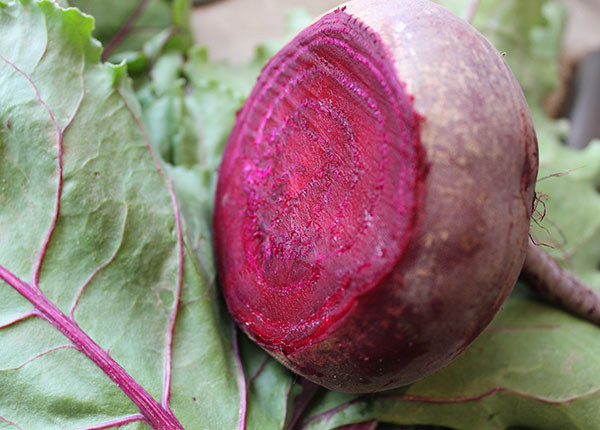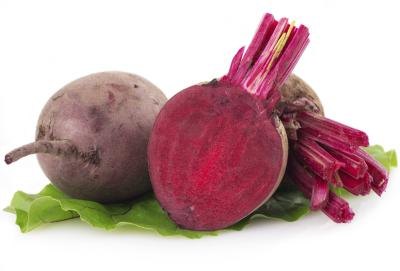 |
| Add caption |
Beets
Health Benefits
Beets are alkaline and helps in acidosis, a harbinger of all diseases.
Beets stimulate liver cells and cleanse and protect bile ducts. It also help cleanse the blood and create more red blood cells. They are useful for curing anemia.
 |
| Add caption |
Rebuild Blood with Beets
Chlorophyll, and beetroot are the most effective treatment options.
Beets contain low protein, organic acids such as folic acid, malic acid, oxalic acid, then vitamins C, B, A, PP, E, and calcium, potassium, magnesium, zinc, iron, and other minerals. The presence of beets in every home is more than necessary.
Beets can help the thyroid gland, circulation, chronic anemia and those who have problems with immune system.
Beets is a great protector of the heart and blood vessels AND also beets have amazing influence on the digestive system. Children who consume beets will have much healthier bones and teeth, and much better blood count than those who do not regularly consume beets. If you regularly consume beets you will drastically improve your general health.
Red beets and their leaves are a high source of folate, which is the natural base of folic acid. Folate helps build tissue and red blood cells. Folic acid from folate is more beneficial rather than to use folic acid supplements.
Beets contain lots of lutein and zeaxanthin, both of which help prevent or even cure macular degeneration and other age related eye issues.
Beets are a high source of phytonutrients called betalains. Beet betalains provide strong antioxidant, anti-inflammatory, and detoxification support.
Beets maintain blood vessel elasticity, and even help eliminate varicose veins.
Beets are high in fiber, potassium, magnesium, niacin, calcium, iron, and biotin. Red coloring in the stool or urine is not uncommon after consuming beets.
Fight Inflammation
Beets are a unique source of betaine, a nutrient that helps protects cells, proteins, and enzymes from environmental stress. It's also known to help fight inflammation, protect internal organs, improve vascular risk factors, enhance performance, and likely help prevent numerous chronic diseases.5 As reported by the World's Healthiest Foods:6Detoxification SupportThe betalin pigments in beets support your body's Phase 2 detoxification process, which is when broken down toxins are bound to other molecules so they can be excreted from your body.
Traditionally, beets are valued for their support in detoxification and helping to purify your blood and your liver.
Eat Your Beet Greens Too
Besides containing important nutrients like protein, phosphorus, zinc, fiber, vitamin B6, magnesium, potassium, copper, and manganese, beet greens also supply significant amounts of vitamin A, vitamin C, calcium, and iron.
Beet greens actually have even more iron than spinach (another leafy green in the same botanical family) as well as a higher nutritional value overall than the beetroot itself. Read "What Are Beet Greens Good For?"If you've never tried beet greens before, don't let them intimidate you. They can be added raw to vegetable juice or sautéed lightly right along with other greens like spinach and Swiss chard.
- Help ward off osteoporosis by boosting bone strength
- Fight Alzheimer's disease
- Strengthen your immune system by stimulating the production of antibodies and white blood cells
Anti-Aging Properties
Eating beets is one of the best days to cleanse the digestive tract and blood. Detoxification in this way combined with the high antioxidant values found in beets is an effective way to help naturally slow aging.
Beets are a great way to help balance pH levels and to alkalize the body as well. The pH scale is used to determine acidity versus alkalinity, with 7.1 to 14 being alkaline and 7 being neutral. Most diseases live in an acidic environment, so your body’s goal is to be slightly alkaline- and many whole foods like fruits and vegetables help to achieve this.
Grains
Eating foods made with whole wheat can help you get more betaine in your diet, since both wheat germ and wheat bran are among the better sources of betaine. Wheat germ contains 1,241 milligrams per 100-gram serving, and wheat bran contains 1,339 milligrams.Vegetables
Spinach is your best for increasing your betaine levels, since it is particularly high in this nutrient, with 645 milligrams per 100 grams. Beets are another good way to get your betaine, since they contain 297 milligrams per 100-gram serving. Try a side of spinach sauteed with garlic and olive oil, add grated or cooked beets to your salads or start your meal off with borscht, a Russian beet soup.
Animal Products
Although meat and poultry aren't particularly good sources of betaine, many Americans get a lot of their betaine from these foods because they eat so much of them, according to the U.S. Department of Agriculture.
Considerations
Considerations
Try Russian Beet Soup (Borscht)
 |
| Add caption |
There are many ways to enjoy beets:For an even more intense flavor, try Borscht, or beet soup, which is a traditional Russian dish. This particular recipe below, from Dirt Doctor, also includes homemade broth, making it particularly nourishing and healing.
- Grate them raw over salads
- Add them to your fresh vegetable juice
- Lightly steam them
- Marinate them with lemon juice, herbs, and olive oil
Borscht
Ingredients:Instructions:
- 1 quart of organic, homemade broth (preferably beef or buffalo)
- 1 tablespoon butter
- 3 or 4 medium size beets – thinly sliced
- 1 onion – thinly sliced
- 1 cup of shredded red cabbage
- 1/8 cup minced parsley
- 1 tablespoon Sherry (optional)
- Lemon juice – 1 tablespoon
- Salt and pepper
- Sour Cream (optional)
- Over medium low heat, melt butter in a medium size soup pot.
- Add onions and beets and cook until soft – about 7 or 8 minutes.
- Add a dash of salt and pepper. Stir in broth.
- Simmer for about 20 minutes. Then add fresh cabbage, parsley, nutmeg, and sherry. Simmer for a couple minutes more, season with additional salt and pepper, serve, and enjoy.
- Add a dollop of crème fraiche or sour cream if you like.